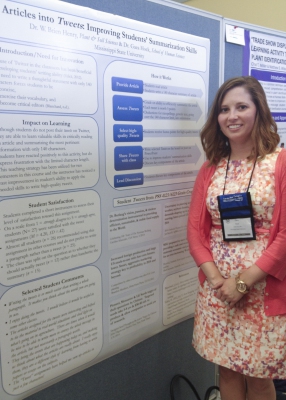
Writer: , MSU Extension Service
MISSISSIPPI STATE -- A professor at Mississippi State University wanted his students to gain a real-world perspective about grain crops, so he challenged them to head straight to the news.
Brien Henry, an associate professor in the MSU Department of Plant and Soil Sciences, used the weekly Delta Farm Press to educate students about the current climate of the grain crops industry. He also incorporated the principles of the social media tool Twitter to help students sharpen their critical thinking and communication skills.
In addition to standard textbook instruction, weekly labs, quizzes and comprehensive exams, students were required to receive the online version of the Delta Farm Press. They had to read any current article the press published about grain crops and summarize specific articles in the form of a tweet.
“I frequently incorporated test and quiz questions from this material to reward the students who read the press. I doubt the students were accustomed to churning through this much material, but once I explained the assignment’s importance and my expectations as a teacher, they embraced the workload,” Henry said.
“It was beneficial for students to see the information presented in the classroom, in a related article and then in an article in a popular press with producers talking about the economic decisions that influence their farms,” he said. “Through a variety of sources, students realized the real-world significance of grain crops.”
Although students didn’t actually post their tweets, the exercise of composing a summary using 140 characters or less encouraged students to think critically and communicate concisely.
Henry assessed the tweets and selected high-quality examples to share with the class. These then served as the basis for the class discussion.
“Reading the best tweets aloud was a teaching opportunity in which I emphasized why I selected the article, what I hoped the students learned from it and how it related to what we covered in class,” Henry said. “With technology today, students tend to communicate in punctuated bursts. I was able to mimic that with this assignment, and the students really seemed to enjoy it.”
Gaea Hock, assistant professor in the MSU School of Human Sciences, evaluated student satisfaction with the assignment.
“I was inspired to measure student satisfaction after learning of the assignment, which I found to be an innovative and creative way to summarize a longer text,” Hock said. “I train future agricultural educators, and I saw this assignment as something worth exploring.”
Hock evaluated Henry’s students and found that nearly all were satisfied with the assignment and would recommend the practice in other courses. Most students preferred writing a tweet over writing a full paragraph, and the class was split on whether or not to actually post tweets on Twitter.
“The next step is possibly exploring the use of Twitter in the completion of the assignment,” Hock said. “I would also like to investigate the correlation between students’ ability to succinctly summarize an article and their ability to write longer texts.”
In the meantime, Henry’s students will continue to study the Delta Farm Press to discover industry insight while employing social media principles to hone their skills as critical thinkers and editors. Henry’s PSS 4123/6123 Grain Crops course is a split level class for undergraduate and graduate students seeking agronomy degrees in the MSU College of Agriculture and Life Sciences.
Source: Delta Farm Press and Twitter augment traditional learning